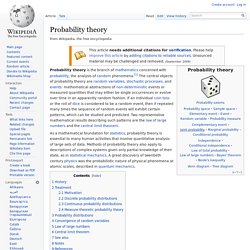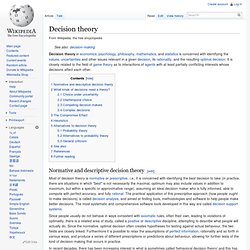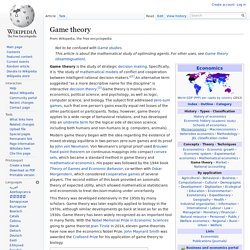

Probability theory. As a mathematical foundation for statistics, probability theory is essential to many human activities that involve quantitative analysis of large sets of data.

Methods of probability theory also apply to descriptions of complex systems given only partial knowledge of their state, as in statistical mechanics. A great discovery of twentieth century physics was the probabilistic nature of physical phenomena at atomic scales, described in quantum mechanics. History[edit] The mathematical theory of probability has its roots in attempts to analyze games of chance by Gerolamo Cardano in the sixteenth century, and by Pierre de Fermat and Blaise Pascal in the seventeenth century (for example the "problem of points").
Christiaan Huygens published a book on the subject in 1657[2] and in the 19th century a big work was done by Laplace in what can be considered today as the classic interpretation.[3] Decision theory. Normative and descriptive decision theory[edit] Since people usually do not behave in ways consistent with axiomatic rules, often their own, leading to violations of optimality, there is a related area of study, called a positive or descriptive discipline, attempting to describe what people will actually do.

Since the normative, optimal decision often creates hypotheses for testing against actual behaviour, the two fields are closely linked. Furthermore it is possible to relax the assumptions of perfect information, rationality and so forth in various ways, and produce a series of different prescriptions or predictions about behaviour, allowing for further tests of the kind of decision-making that occurs in practice.
In recent decades, there has been increasing interest in what is sometimes called 'behavioral decision theory' and this has contributed to a re-evaluation of what rational decision-making requires.[1] What kinds of decisions need a theory? Game theory. Game theory is the study of strategic decision making.

Specifically, it is "the study of mathematical models of conflict and cooperation between intelligent rational decision-makers. "[1] An alternative term suggested "as a more descriptive name for the discipline" is interactive decision theory.[2] Game theory is mainly used in economics, political science, and psychology, as well as logic, computer science, and biology.
The subject first addressed zero-sum games, such that one person's gains exactly equal net losses of the other participant or participants. Today, however, game theory applies to a wide range of behavioral relations, and has developed into an umbrella term for the logical side of decision science, including both humans and non-humans (e.g. computers, animals).